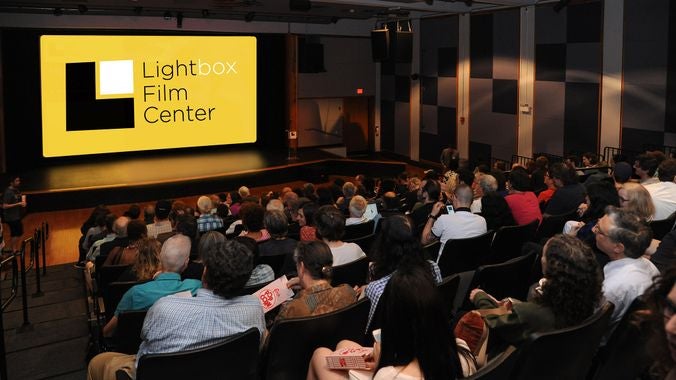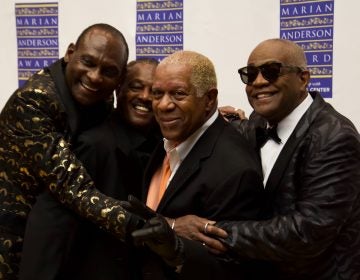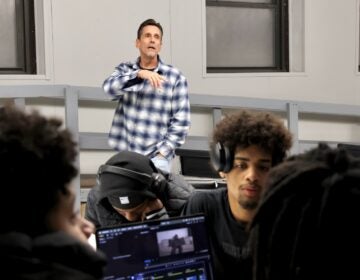Philly’s Lightbox Film Center starts restoration work to give films a ‘second life’
After 43 years of presenting foreign and avant-garde film, the Lightbox Film Center launches a film restoration program to repair and revive old films.

The Lightbox Film Center. (Courtesy of Lightbox Film Center)
After 43 years of presenting foreign and avant-garde film, the Lightbox Film Center has launched a film restoration program. In addition to screening rare and underground movies, the center is now working to repair and revive old films.
The center recently merged with the University of the Arts, which gave it access to resources to move into film restoration.
“Becoming part of a university and having this support, it seemed like a logical extension to expand our footprint to not only be an exhibitor, but to also select films I feel should have a second life,” said director and curator Jesse Pires. “It’s a very logical continuation of what we do.”
The center’s first restoration project is the little-known film from 1989, “Life is Cheap…But Toilet Paper is Expensive,” by the Hong Kong-American filmmaker Wayne Wang. The freshly minted and re-edited 4K digital master will be screened at the Lightbox center on Friday evening.
Wang is better known for directing high-profile Hollywood films like 1993’s “Joy Luck Club” and the 2002 Jennifer Lopez comedy “Maid in Manhattan.” “Life is Cheap” is decidedly rougher than those.
The film is a breathless rush through the underbelly of Hong Kong, as a mob courier with a briefcase filled with unknown material and handcuffed to his wrist, misses his connection. So, wearing an American cowboy hat and silver-tipped boots, he wanders through the streets “where anything goes and everything happens,” including disturbing scenes of violence, depravity, and sex. The film was originally given an X rating.
“I know Wayne’s work pretty well, but this one slipped past my radar,” said Pires. “I finally got to see it and I thought: This is such a unique and interesting film in terms of Wayne’s career, but it also blew me away as an important piece of indie filmmaking that just never really got out there.”
“Life is Cheap” was released at a time American cinema was arguing over how films get rated. Like other movies at that time with artistic aspirations – Peter Greenaway’s “The Cook, the Thief, His Wife, and Her Lover” and Pedro Almodovar’s “Tie Me Up! Tie Me Down!” – “Life is Cheap” was initially given an X rating by the Motion Picture Association of America, a rating which, in the minds of many, puts it in the pornography category.
Studios sued to eschew the X and put their own ratings on films, and prominent film critic Roger Ebert took on the MPAA for its inability to to distinguish adult films from pornography. “Life is Cheap” was ultimately released with a proprietary “A” rating, for adults-only.
It won the KNF award award at the 1990 Rotterdam Film Festival, but it was not well received by critics, who said it had “the narrative logic of a tilted pinball machine,” and “most of the time you can’t tell what it’s about.”
“By today’s standards, I don’t see it as something deserving of an X rating,” said Pires. “There’s certainly some shocking things, but when you see the Tarantinos and all the folks that came right after, it falls right in line with that. It was maybe a year or two ahead of its time.”
Even Wang believes he may have overdone it. Over the years he has recut the film several times to tone down its shock, which he admits now was done in part to test the audience. He says the edit for the new digital remaster is the definitive version.
“I could get a little more distance from it and I could take out some things that were overly rebellious, or just challenging the so-called film system, and not really serving the purpose of the film itself,” he said from his home in San Francisco.
Wang points to an enormously long chase scene in the film, that takes up about 10 minutes of screen time. He and his collaborators made it that long as a kind of joke on the audience.
“The three of us – the [director of photography] and the writer and myself – all decided if we didn’t know what to shoot on a certain day, we would just go out and run, and do a chase scene. We continued that chase scene every time we didn’t quite know what to shoot,” said Wang. “It was rather long and rather protracted. Over the years when I watch it, I go: ‘This is enough. I don’t need to keep putting people into a very difficult position.’”
The film was shot in Hong Kong, where the first edit was made. This was 1989, when Wang was looking at both his footage and the unfolding situation in Tiananmen Square in Beijing, where the Chinese military turned on a student demonstration, killing several thousand.
“I was getting so enthusiastic and supporting of the students, and then all of a sudden there’s this massacre happening. It was really heartbreaking,” Wang said. “I remember that kind of just gelled everything for me in terms of seeing what the film should be.”
“There is a lot of violence in the film. There is a lot of patriarchal bullying. There is this whole thing that reflects, in a very parallel way, what was going on in China at that time. That would be one of the real interesting reasons that this film is being restored,” he said.
The digital restoration by Lightbox Film Center not only created a new print from the original master, but gave Wang a chance to re-edit the film into a final director’s cut. After 33 years, he says this is the last time he will tinker with “Life is Cheap.”
Pires is already planning the next film restoration project. It will be “The Innerview,” a 1973 psychedelic film by Richard Beymer, an actor better known for playing Tony in the original film version of West Side Story.
WHYY is your source for fact-based, in-depth journalism and information. As a nonprofit organization, we rely on financial support from readers like you. Please give today.







